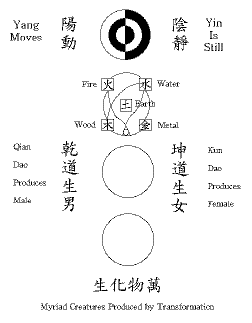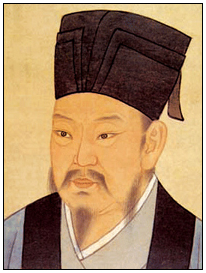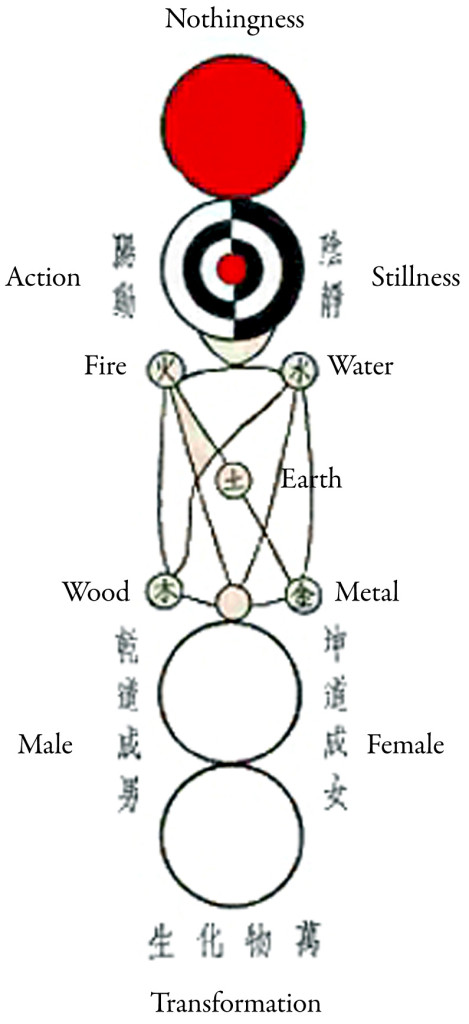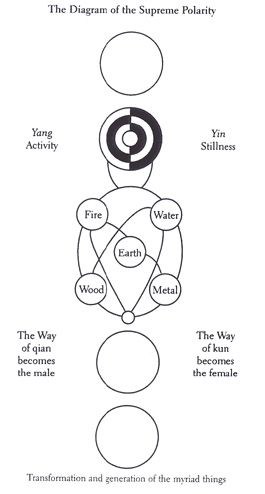Zhou Dunyi
Zhou Dunyi (Chinese周敦颐/周敦颐, Pinyin Zhou Dunyi, W.-G. Chou Tun- yi, * 1017, † 1073 ) was a Chinese philosopher of the school of Neo-Confucianism.
Life
Zhou comes from Daozhou in today's Hunan Province. He held a number of subaltern public posts. However, his career suffered from Zhou's refusal to participate in the official official exams. Short term he served the brothers Cheng Hao and Cheng Yi, who should ascend to leaders of the two major schools of Neo-Confucianism. Apart from this, Zhou remained long unknown before posthumously Zhu Xi (1130-1200) made him one of the founding fathers of Neo-Confucianism. He spent his last years on Mount Lushan.
Philosophical works
Zhou Dunyis central importance for the Neo-Confucianism is primarily due to his contributions to cosmology and metaphysics of this school of thought.
The Taiji
His main works include the diagram of " Tai Chi Tu" (Chinese太极 图/太极 图, Pinyin Taiji Tú, picture of Taiji ' ) and its interpretation " Taiji Tu Shuo " (Chinese太极 图 说/太极 图 说, Pinyin Taiji Tú Shuo, Declaration of Figure of Taiji '). They would later form the basis of cosmology by Zhu Xi: Zhou's concept of Taiji appears as a heavenly principle tianli (Chinese天理, Pinyin tiānlǐ ).
The standing in the center of Zhou's philosophy Taiji diagram ( translated as: The Ur - finite, the Supreme Being) is for him the source of all things in the universe that is both within and beyond the things. In his calm expression it is the Yin, a symbol of the mysterious and feminine in Chinese thought. In its active expression of it, however, the Yang produces, which stands for the rational and male. It is the source of the basic structures and phases of change, as they are expressed in the five- element theory, and shows the two basic principles of the I Ching, the Book of Changes: The Divine Principle Qian and the earth-principle customers, in turn, the male and female embody.
The Wuji
The antonym for Taiji forms with Zhou, the concept of Wuji ( translated as: The Un - finite, the highest non-being ). Already in the first sentence of his main work he puts these two at first glance diametrically opposite terms equal to each other. Just hereby Zhou reaffirmed but the all-encompassing nature of Taiji as a source of all things: You also shown by the fact that they even encompassed her own opposite.
Role of humanity
Humanity eventually absorbed into Zhou's system the five elements in their highest and purest form, which enables them to take a more critical role in the life and in the universe. Here receives Zhou Dunyis their specific philosophy Confucian expression, is hereafter but in the humanity of the key to understanding the entire universe. In particular, in its ideal form as a scholar of the man considered the key figure in the universe. In this way, a metaphysical framework which emphasizes the Confucian emphasis on the unique relationship between man and heaven, which gives the universe its moral structure.
Taoist influences
Already the idea of Taiji Zhou Dunyi should have acquired by Taoist monks. More clearly the influences of this doctrine, however, show in a second term of Zhou's teaching building, the emerging already in the Dao De Jing Wuji, and especially in the thought that the Taiji must mitbeinhalten also his own contrary precisely because of its Comprehensiveness.
This approach ultimately leads to the integration of Buddhist and Taoist teachings and symbols in Zhou's own neokonfuzianisches doctrine: For example, even the two religions is familiar concept of emptiness in Zhou's great- finite. This may be understood as a form of syncretism by no means, but rather as an affirmation of the Confucian claim the ontological priority of the primal finite.
In addition, can be divided into Zhou's thinking more Daoist influences demonstrate: In the center of his teaching the ideas of the rest ( jing ) and of desire are ( Wuyu ); the wise Zhou defined as a person who is able to achieve both ideals. Zhu Xi was well aware that such approaches, they are thought to its logical conclusion, dangerously close to lead into the orbit of Buddhism and Daoism - which is why he has always stressed even more the metaphysical structure of Zhou's thinking, and less postulated by Zhou need for culture of peace and of desire.
Literary work
To a lesser extent Zhou Dunyi has operated as a poet and essayist. His devotion to the Lotus he has given in his well-known magazine " justify my love of lotus flowers " expression: In radiant purity they grow out of muddy ground and not defile himself; however they know neither arrogance nor vanity. Also verästele and not entangle them yourself. While the chrysanthemum of the hermit was among the flowers, the peony stand for the honorable favorite. The true gentleman embodies, however, only the Lotus.








